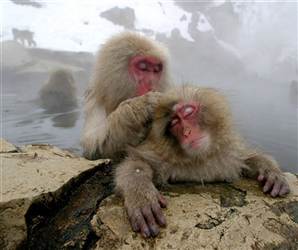Study: Monkeys ‘pay’ for sex by grooming
In the primate world, sex is subject to the law of supply and demand
|
|
|
|
By Gillian Wong
![]()
updated 10:03 a.m. PT, Sat., Jan. 5, 2008
SINGAPORE – Male macaque monkeys pay for sex by grooming females, according to a recent study that suggests the primates may treat sex as a commodity.
“In primate societies, grooming is the underlying fabric of it all,” Dr. Michael Gumert, a primatologist at the Nanyang Technological University in Singapore, said in a telephone interview Saturday.
“It’s a sign of friendship and family, and it’s also something that can be exchanged for sexual services,” Gumert said.
Gumert’s findings, reported in New Scientist last week, resulted from a 20-month observation of about 50 long-tailed macaques in a reserve in Central Kalimantan, Indonesia.
Gumert found after a male grooms a female, the likelihood that she will engage in sexual activity with the male was about three times more than if the grooming had not occurred.
And as with other commodities, the value of sex is affected by supply and demand factors: A male would spend more time grooming a female if there were fewer females in the vicinity.
“And when the female supply is higher, the male spends less time on grooming … The mating actually becomes cheaper depending on the market,” Gumert said.
Other experts not involved in the study welcomed Gumert’s research, saying it was a major effort in systematically studying the interaction of organisms in ways in which an exchange of commodities or services can be observed ”” a theory known as biological markets.
Dr. Peter Hammerstein, a professor at the Institute for Theoretical Biology at Humboldt University in Berlin and Dr. Ronald Noe, a primatologist at the University of Louis-Pasteur in Strasbourg, France, first proposed the concept of biological markets in 1994.
“It is not a rare phenomenon in nature that males have to make some ‘mating effort’ in order to get a female’s ‘permission’ to mate,” Hammerstein said in an interview, likening the effort to a “fee” that the male pays.
“The interesting result of Dr. Gumert’s research on macaque mating is that the mating market seems to have an influence on the amount of this fee,” Hammerstein said.


